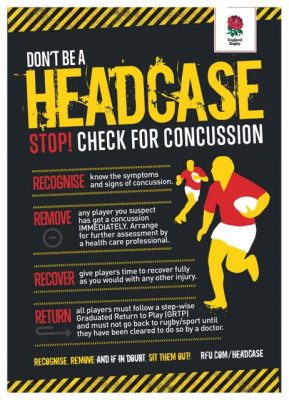Gents,
You are no doubt aware of the current focus on concussion in sport and in rugby in particular. Please would you take a few minutes to read the below information, it is important.
 The below notes are just a subset of the information that is available and I would urge you to familiarise yourselves with www.rfu.com/concussion and ideally to complete the online interactive course that may be accessed there.
The below notes are just a subset of the information that is available and I would urge you to familiarise yourselves with www.rfu.com/concussion and ideally to complete the online interactive course that may be accessed there.
This process is for the benefit of players and is designed to assure your welfare; it is NOT optional. To assure a safe and appropriate return to the game then I must insist that you adhere to the process in full and would ask that you communicate clearly with our Physio and Management Team in this regard.
The RFU has identified four stages in this process:
RECOGNISE
It is imperative that all stakeholders, players, coaches, spectators, officials etc are able to spot possible concussions and their symptoms. Some of these indicators are listed below:
- Knocked out
- Headache
- Dizziness
- Feel dazed, “dinged” or stunned
- Loss of vision, seeing double or blurred, seeing stars or flashing lights
- Ringing in the ears
- Sleepiness
- Stomach ache, stomach pain, nausea, vomiting
- Poor coordination or balance, staggering around or unsteady on feet
- Slurred speech
- Poor concentration
- Strange or inappropriate emotions (i.e. laughing, crying, getting angry easily)
- Feeling generally unwell
- Does not know time, date, place, period of game, opposing team, or the score in the game – use the Pocket SCAT3(PDF 128KB) questions to help you
- General confusion
- Cannot remember things that happened before and/or after the injury
- Seems slow to answer questions or follow directions
- Seems easily distracted
- Not playing as well as expected
- A blank stare/glassy eyed, “the lights are on but nobody’s home”
REMOVE
Should you consider that a player is concussed or that they are exhibiting any of the above then YOU should ensure that the player is removed from play without delay. A player who has been removed from play with suspected concussion should:
- Must not return to play that day
- Should not be left alone
- Should be seen by a Healthcare Practitioner as soon as possible that day
- Should not drive or ride a bike/motorbike
- Should not drink alcohol
RECOVER
The recovery phase will take a MINIMUM of 19 days if the player recovers well and adheres to the process promptly and fully, (23 days for U19s).
The stages in this path to recovery are as below:
- Day 0, Incident / Injury
- Day 1 – 14, Stage 1, Rest, initially avoiding driving, reading, watching TV or using a computer
After completion of Stage 1 it is recommended that a player is seen by a Healthcare Practitioner to confirm that they are ‘symptom free’ and have been for at least 24 hours. When such confirmation is available they may proceed to Stage 2
- Day 15 Stage 2 Light Aerobic Exercise
- Day 16 Stage 3 Sport Specific Exercise
- Day 17 Stage 4 Non-contact Training
Following successful completion of Stage 4 it is the player’s responsibility to obtain medical clearance before returning to play.
- Day 18 Stage 5 Full Contact Practise
- Day 19 Stage 6 Considered ready to return to play
If any symptoms recur whilst progressing through Stages 2 to 5 the player must consult with their Medical Practitioner before returning to the previous stage and attempting to progress again after a minimum 24h period of rest without the presence of symptoms.
As these activities are likely to take place away from the Club their outcome needs to be clearly and formally communicated to our Physio and Management Team so that a formal record may be maintained.
RETURN
Once a player has completed the recovery phase without recurrence of symptoms then they may be considered fit to return to play.
If you have any questions or concerns on any part of this process then please don’t hesitate to contact Matt or I.
Thanks for your co-operation and understanding.
Best
Nick Lambert
Head Coach – Ealing Men’s Section









